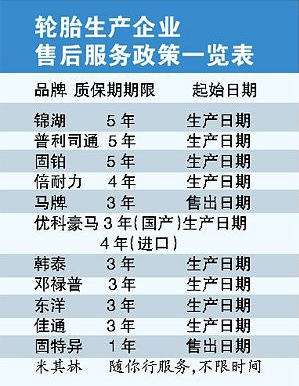New tires will also expire the "secret" revealing the warranty period of tires Maybe you only paid attention to the warranty period of the car, but you have no idea that the tire has a warranty period. Once you experience tire wear, your first thought is to replace it, instead of using the warranty period for a free replacement. Perhaps because of consumer "negligence", tire companies do not "strictly" stipulate the "warranty period". ◠Buy in minutes: Warranty "Expired" tires At the end of March, the associations of Consumers Associations of 28 provinces and cities (CPC, Consumer Protection Committee) joined hands to Michelin, Bridgestone, Goodyear, Kumho, Dunlop, Hankook, Yokohama, Malay, Pirelli, Cooper , Jiatong, Toyo 12 sole-proprietorship or joint-venture tire brands carried out a large-scale survey on the after-sales service policies of tire companies. The survey found that companies ranked top in the market not only have different lengths of warranty, many tires have a warranty and claim period from the date of production, with a minimum of three years and a maximum of five years. In other words, if the inventory time is short, consumers enjoy a long warranty period; conversely, if the tire inventory for a long time, then consumers can enjoy the warranty period will be shortened accordingly. When a tire with more than two years worth of inventory is bought by consumers, consumers have almost no way to enjoy various claims during the warranty period. Recommendation: The warranty period should be calculated from the date of sale of the product; or the company should provide consumers with two different warranty periods of different starting times for consumers to choose their own calculation methods. "National Standard" provides: The national recommendation standard SB/T 10468.2-2008 "Tire Distribution Company's Regulations for the Settlement of Claims Requirements" issued by the Ministry of Commerce in 2009 stipulates: "Tire manufacturers, distributors, and repairers who purchase or repair tires for users/consumers. Take responsibility for the corresponding repairs, replacements and returns (hereinafter referred to as the "three guarantees")." The claim period for tyres is: "The period of claims shall be calculated within three years of the date of production of the tyre's sidewalls, or the selling company shall sell the goods within one year as the effective period of the claims." At the same time, the State encourages enterprises to make strict In the national standard or industry standard corporate standards. †Automobile Three Guarantees Regulations: The quality assurance period for consumable parts is expressly stated by the manufacturer on the Three Guarantees certificate. ◠Compensation for non-quality issues: "Improper use" as a shield In actual use, once problems occur with tires, some manufacturers always use “improper use†as a shield against legal liability. Whether it is improper use of the consumer or the quality of the product itself, who is responsible for identifying the attribution of responsibility, which has become the focus of disputes in consumer disputes. At present, most tire companies do not clearly specify compensation for non-quality issues. Only a few tire manufacturers have adopted non-quality compensation policies. For instance, Kumho introduced its VIP product guarantee service and special guarantee service last year: it provides conditional free replacement compensation policy for specified tires caused by road problems and tyre bulging caused by impact. "National Standard" provides: The "Administrative Measures" as a line regulation lists the "improper use" of 5 types of 19 kinds of consumers, and even the "improper storage" and "unsuitable assembly" may have been attributed to the responsibility of the car manufacturer. The manufacturer (or the seller) shall not be liable for any early damage to the tire caused by improper use, and thus cause personal or property damage, and has the right to refuse the use of the claimant's claim. Recommendation: Introduce third-party testing agencies that are not for profit. ◠Wear claims: The difference is not cheap. Regarding the claim standards for automobile tires during the warranty period, according to surveys, individual tire companies currently perform wear and tear fees exceeding 1.6mm; Kumho, Hankook, and Cooper tire brands perform wear according to the Claims Requirements. The 2.0mm fee requirement was imposed; Dunlop and the horses chose to pay the consumer a full payout without any wear and tear, with the remaining pattern higher than 1.6mm. Wear exceeds 1.6mm and exceeds 2.0mm, although the difference between the two is only 0.4mm, but for the consumer, the cost is very different. Suggestion: The claim standard is lower than the relevant national standards, otherwise it will obviously benefit the tire enterprise. "National Standard" provides: After purchasing the tires, the user found that there were product quality problems in accordance with the state's "Three Guarantees" regulations before the use of the tires, and the use of the tires after the purchase of the tires, the use of the tire pattern wear within ≤ 2mm found that there are quality problems, Replaceable tires; After the tires are purchased by the user, the tire tread wear generally exceeds 2 mm, and quality problems are found. If the tire manufacturer’s responsibilities are identified, the tire manufacturer should compensate for the pattern wear. Portable Axle Weigh Scales,Wireless Portable Axle Scale,Dynamic Axle Weigh Scales,Wired Portable Truck Axle Scale Jiangsu Lude Electrical Manufacturing Co.,Ltd , https://www.ludescale.com